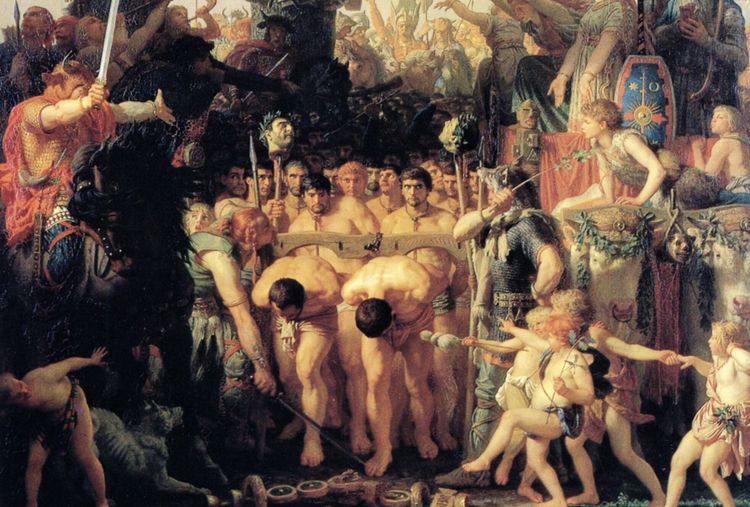Through the Glass Ceiling Darkly | The Greater Male Variability Hypothesis & The Myth of Corporate Sexism

“A perfect man and a perfect woman should no more be alike in mind than in face, and perfection admits of neither less nor more.” - Jean Jacques Rousseau ¹
The glass ceiling is a metaphor for an invisible barrier that prevents women and other marginalized groups from reaching the upper echelons of management within a company or organization. According to feminist scholars, the barrier is a product of discrimination based on sexism and misogyny from a systemic and oppressive patriarchy. However, those who assert such claims fail to recognize the socio-biological factors which attribute to men’s exceptionalism within the workplace. Evidence to the contrary notwithstanding, the glass ceiling remains a cornerstone of feminist thought. But as we will soon see, those views shatter much like the ceiling they desperately want to believe exists.
Anti-discrimination laws for women have largely removed sexist hiring practices. And affirmative action has, to some capacity, inverted them in favor of women. They currently make up nearly half the labor force in the U.S. And in every known organization across corporate America, several women have dominated men both in career and finances. Given these factors, why are there more men than women in upper management? Why are the STEM fields still male-dominated despite decades of support from governments and corporations for gender equality? The answer is not oppressive patriarchy but evolutionary biology in conjunction with social influences that shape men’s and women’s career choices. An example of this includes the well-documented phenomenon known as the greater male variability hypothesis. Consider the following graph:
Notice the distribution of the two bell curves. For women, we see fewer extremes on the tail ends of the spectrum and a greater distribution in the center, whereas for men, their bell curve is much flatter and more evenly distributed. This graph illustrates that men and women are the same—but only on average. On the extreme ends of the spectrum, however, it is a much different story. In terms of cognitive ability, males tend to vary more than females, meaning there are more male exceptions than female exceptions, which fall on both the lower and higher end of the spectrum. In other words, there are more male idiots than female idiots, but there are also more male geniuses than female geniuses. Darwinian biology, then, is the real culprit behind the supposed glass ceiling.
Evolutionary biologist, Heather Heying, explains this contrast in detail:
“The greater male variability hypothesis, for which there is research evidence, suggests that males and females are basically the same on average. The standard deviation for men is higher which means you would expect to see more men at both tails of the distribution. Which is to say more male geniuses in this particular regard and more male idiots as well. Men who can’t do math at all and men who are much better than the vast majority of the population. Not to say that there aren’t women in both of those categories as well, but you would expect to see more men.” - Heather Heying ²
Many voices in support of this view have spoken on this topic to no avail. Despite the empirical evidence, heated debates still ensue within intelligentsia, especially from those who still cling to the women’s discrimination narrative. The Pinker/Spelke debate is one such example:
"I think the reason there's a bias to think that men have greater natural talent for math and science is that when we look around the world and ask, who's winning the Nobel Prizes and making the great advances in science, what we see, again and again, is men. Although Linda Buck received this year's Nobel Prize in physiology or medicine, for the most part it's overwhelmingly men who are reaching the upper levels of math and science. It's natural to look at that and think, there must be some reason, some inner difference between men and women, which produces this enormous disparity. And I quite agree with you that good statistical reasoning should lead you to think, the next student who comes along, if male, is more likely to join that group of Nobel Prize winners."
"What I would like to suggest is that we have good reasons to resist this kind of conclusion, and the reasons aren't only moral. Let me just use an analogy, and replay this debate over the biological bases of mathematics and science talent 150 years ago. Let's consider who the 19th century mathematicians and scientists were. They were overwhelmingly male, just as they are today, but also overwhelmingly European, not Asian. You won't see a Chinese face or an Indian face in 19th century science. It would have been tempting to apply this same pattern of statistical reasoning and say, there must be something about European genes that give rise to greater mathematical talent than Asian genes do."
"If we go back still further, and play this debate in the Renaissance, I think we would be tempted to conclude that Catholic genes make for better science than Jewish genes, because all those Renaissance scientists were Catholic. If you look at those cases, you see what's wrong with this argument. What's wrong with the argument is not that biology is irrelevant. If Galileo had been switched at birth with some baby from the Pisan ghetto, the baby raised by Galileo's parents would not likely have ended up teaching us that the language of physics is mathematics. I think that Galileo's genes had something to do with his achievement, but so did Galileo's cultural and social environment: his nurturing. Genius requires huge amounts of both. If, in that baby switch, Galileo had found himself growing up in the Pisan ghetto, I bet he wouldn't have ended up being the example in this discussion today either. So yes, there are reasons for this statistical bias. But I think we want to step back and ask, why is it that almost all Nobel Prize winners are men today? The answer to that question may be the same reason why all the great scientists in Florence were Christian." - Elizabeth Spelke ³
PINKER: "I think you could take the same phenomenon and come to the opposite conclusion! Say there were really was such a self-reinforcing, self-perpetuating dynamic: a difference originates for reasons that might be arbitrary; people perceive the difference; they perpetuate it by their expectations. Just as bad, you say, is the fact that people don't go into fields in which they don't find enough people like themselves. If so, the dynamic you would expect is that the representation of different genders or ethnic groups should migrate to the extremes. That is, there is a positive feedback loop where if you're in the minority, it will discourage people like you from entering the field, which will mean that there'll be even fewer people in the field, and so on. On either side of this threshold you should get a drift of the percentages in opposite directions. Now, there is an alternative model. At many points in history, arbitrary barriers against the entry of genders and races and ethnic groups to various professions were removed. And as soon as the barrier was removed, far from the statistical underrepresentation perpetuating or exaggerating itself, as you predict, the floodgates open, and the formerly underrepresented people reaches some natural level. It's the Jackie Robinson effect in baseball. In the case of gender and science, remember what our datum is. It's not that women are under-represented in professions in general or in the sciences in general: in many professions women are perfectly well represented, such as being a veterinarian, in which the majority of recent graduates are women by a long shot. If you go back fifty years or a hundred years, there would have been virtually no veterinarians who were women. That underrepresentation did not perpetuate itself via the positive feedback loop that you allude to." - Steven Pinker ³
And indeed, evidence has shown this to be the case. As societies become more egalitarian, less women, not more, enter into STEM fields. Stoet and Geary published a paper documenting this phenomenon. Even when women are given the option to have a successful STEM career, very few actually choose to do so. The denial of sex differences in favor of ideological presumptions of sex sameness is an untenable position.
Darwinian philosopher, Helena Cronin, echoes these sentiments in another debate, speaking directly about the glass ceiling myth:
“The concept of the glass ceiling is all about averages! That is what it’s about. Of course, the idea of when somebody comes to an interview that it’s about individuals so you shouldn’t look or ask, “are they male or female?” If it’s meritocracy alone you’re concerned with. You might be concerned if they’re male or female for other reasons. For example, you might be concerned about it in a jury in a rape case or something of that kind. These are very delicate and difficult questions, but certainly if it’s meritocracy that you’re concerned with then you shouldn’t care whether it’s male or female. You look at what their CV says—what their performance has been—but averages make a huge difference. And, unfortunately, they are taken broadly in policy because people deny there are sex differences. Because they deny there are sex differences, they assume there’s a glass ceiling preventing women from getting to the top and women are prevented from getting onto boards. Those are both in general. They assume that and say it must be discrimination. No, it’s not discrimination! If you look at the data the real research on this, if you look at the data, it’s very clear that men and women have somewhat slightly different life priorities. They're fairly slight differences particularly compared to some species in mammals in which the males are hugely different both literally and figuratively from the females. We’re not terribly different in lots of ways, but these life priorities make enough difference to get more men in the board rooms, more men to the top, and for women to take jobs that are paid differently and to do it more often part-time to stay at a lower level—willingly—willingly—that’s what they actually prefer. Because their life priorities involve doing other things as well.” - Helena Cronin ⁴
The variability hypothesis is not only specific to cognition but also extends to other traits like physical stature and personality, which are found in all sexually dimorphic species. Research has shown prenatal androgens as a possible driving force behind developmental plasticity in humans, explaining why there is greater male variation. For example, large doses of prenatal testosterone have masculinizing effects on both the brain and body, resulting in psychological changes like sexual orientation and gender identity, or even subtle physical changes such as a lower 2D:4D ratio where the ring finger is longer than the index finger. ⁵
In light of these realities, however, there have been concerted efforts by tech corporations and other institutions to censor any notions of sex differences. James Damore, a Google engineer, had written an internal memo ⁶ regarding psychological differences between men and women to explain why fewer women worked in software engineering; he was subsequently terminated soon after for sexism. ⁷ Ted Hill, a professor emeritus at the Georgia Institute of Technology, had developed a mathematical model to explain how differences in genetic variation between males and females could occur in the same species. His paper, ready to go public, was quickly rejected by publishers and dismissed as pseudoscience despite prior acceptance from peers. ⁸
Indeed, feminists are still gathering up the broken shards of their glass ceiling myth in the hopes of piecing it back together again. But the scientific evidence is mounting, and soon there will be no escaping the truth—that for every female championship boxer, Chessmaster, music prodigy, Nobel laureate, etc., there will always be several males who will either meet or exceed these potentialities. Remember, though; the same exceptionalism applies to the opposite end of the spectrum; for every female moron, addict, criminal, bum, etc., there will be countless males who will also meet or exceed these tragedies. Exceptionalism, then, is neither fair nor equivocal.
By no means does this justify sexism or discrimination. If anything, the opposite is true. Because there are innate sex differences, we should learn to appreciate men and women for who they are instead of treating them like defective versions of the opposite sex. Men and women are designed to be complementary—to be companions and not competitors. If only one sex wins—then both sexes lose. And when one sex tries to encourage the other to be more like them, the outcomes always lead to disappointment.
Or as philosopher Rousseau once argued:
“To cultivate the masculine virtues in women and to neglect their own is evidently to do them an injury. Women are too clear-sighted to be thus deceived; when they try to usurp our privileges they do not abandon their own; with this result: they are unable to make use of two incompatible things, so they fall below their own level as women, instead of rising to the level of men.” - Jean Jacques Rousseau ¹
According to radical feminists, however, such views as Roseaus would be considered misogynistic . Hence why merit based competition is labeled as discriminatory and companionship with men as subjugation. Ironically, as we’ve seen in this video, it is the female exceptions within intelligentsia who can see through their sophistry, understanding that equality does not imply sameness.
So, if anyone claims there’s a glass ceiling, remember—exceptions to the rule are rare, and female exceptions to the rule are even rarer. Let’s celebrate and appreciate the differences between men and women. Because only by embracing them will we have true harmony between the sexes and find success together.





